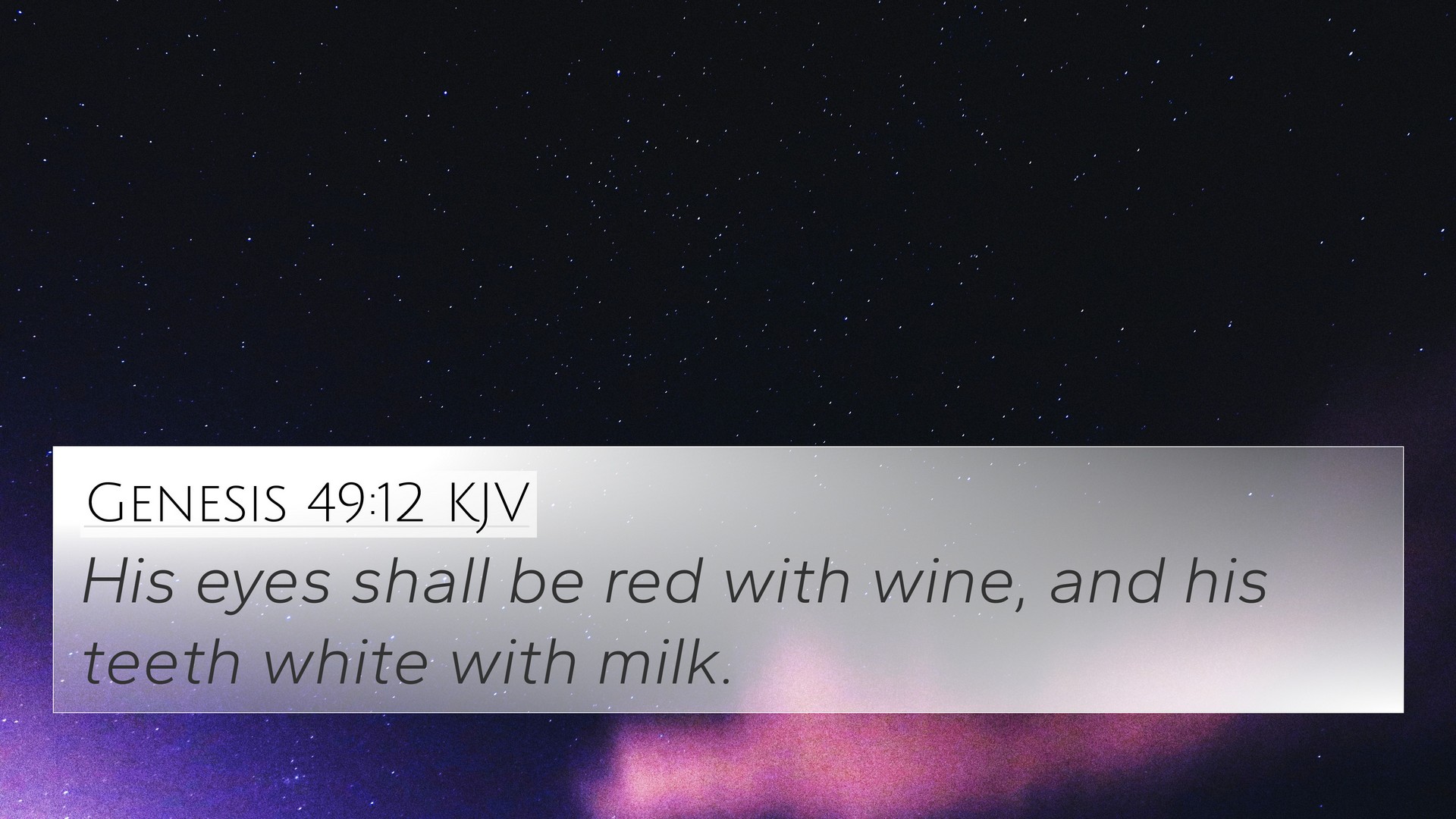Meaning of Genesis 49:12
Verse Context: Genesis 49:12 states, "His eyes shall be red with wine, and his teeth white with milk." This verse is part of Jacob's blessings to his sons, in which he prophesies the future characteristics and traits of each tribe descended from them. Being a significant moment at the end of Jacob's life, it captures the essence of the blessings bestowed upon the tribes of Israel.
Summary of Insights
This brief yet profound verse holds deeper meanings when considered within the context of biblical interpretation. The imagery of "red with wine" suggests joy, abundance, and perhaps a sense of celebration or prosperity, while "white with milk" may symbolize purity, nourishment, and health. These sentiments echo themes prevalent throughout Scripture.
Commentary Insights
- Matthew Henry's Commentary: Henry explains that the allusion to wine could indicate strength and vitality, suggesting a character marked by joy and festivity. The mention of milk reinforces the idea of prosperity and divine providence overflowing into his life and the life of his descendants. It symbolizes a life that nurtures and sustains others.
- Albert Barnes' Commentary: Barnes notes that wine often represents a celebratory spirit and abundance, while milk, being a staple food, represents wealth and sustenance. The combination implies a blessed life that not only enjoys things personally but also has enough to support and provide for others.
- Adam Clarke's Commentary: Clarke views this verse through a socio-cultural lens, suggesting that the imagery of rich sustenance reflects the privileges that come from a prosperous and bountiful land, indicative of the blessings to be bestowed upon the tribe of Judah, from which kings and leaders would arise, including King David and ultimately Christ.
Connections to Other Bible Verses
Genesis 49:12 can be enriched through cross-references to other relevant scriptures that highlight the themes of prosperity, blessing, and divine favor.
- Deuteronomy 33:16: "And for the precious things of the earth and fullness thereof, and for the good will of him that dwelt in the bush: let the blessing come upon the head of Joseph." This verse echoes the theme of abundance and divine blessings.
- Proverbs 3:10: "So shall thy barns be filled with plenty, and thy presses shall burst out with new wine." This reflects the connection between divine favor and material blessings.
- Psalms 49:14: "Like sheep they are laid in the grave; death shall feed on them; and the upright shall have dominion over them in the morning." This verse signifies the continued blessings of the righteous beyond earthly life.
- I Peter 2:2: "As newborn babes, desire the sincere milk of the word, that ye may grow thereby." Here, milk is referenced as sustenance for spiritual growth, akin to the prosperity imagery in Genesis 49:12.
- John 2:10: "And saith unto him, Every man at the beginning doth set forth good wine; and when men have well drunk, then that which is worse: but thou hast kept the good wine until now." This aligns with the joy and abundance that wine symbolizes in the biblical context.
- Revelation 7:17: "For the Lamb which is in the midst of the throne shall feed them, and shall lead them unto living fountains of waters: and God shall wipe away all tears from their eyes." This depicts a future prosperity and nourishment divine grace provides.
- Isaiah 55:1: "Ho, every one that thirsteth, come ye to the waters, and he that hath no money; come ye, buy, and eat; yea, come, buy wine and milk without money and without price." This reinforces the idea of abundant spiritual blessings available to all.
Thematic Connections
Genesis 49:12, through its use of wine and milk, can be mapped onto broader theological themes found in the Bible:
- Abundance and Provision: Many scriptural references emphasize God’s provision for His people, as seen in Philippians 4:19, where it is stated that God will provide for all needs according to His riches in glory.
- Joy and Celebration: Wine is a common motif for joy in the Bible. The use of wine at events like weddings underscores celebration, as found in Jesus’ first miracle in John 2.
- Purity and Nourishment: Milk as symbolic of spiritual nourishment ties back to verses such as Hebrews 5:12-14, where the author discusses the need for spiritual growth and maturity.
Conclusion
Genesis 49:12 serves as a pivotal moment that encapsulates the blessings of abundance, joy, and sustenance. By linking this verse to others in scripture, we can see the vast network of themes that enrich its interpretation. Engaging in comparative Bible verse analysis offers a deeper understanding and appreciation of how various biblical texts converse with one another to illuminate God’s message and purpose.
Utilizing tools for Bible cross-referencing can enhance one’s study experience, promoting a more profound grasp of scriptural connections. Tools such as Bible concordances and Bible reference resources provide a solid framework for cross-reference Bible study, guiding believers in identifying how different scriptures relate to and support one another.



